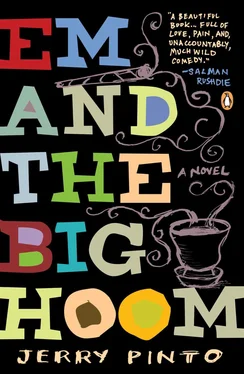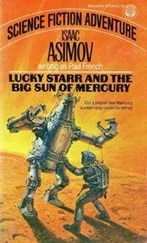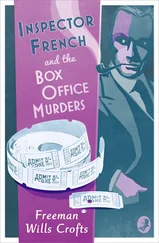Jerry Pinto - Em and the Big Hoom
Здесь есть возможность читать онлайн «Jerry Pinto - Em and the Big Hoom» весь текст электронной книги совершенно бесплатно (целиком полную версию без сокращений). В некоторых случаях можно слушать аудио, скачать через торрент в формате fb2 и присутствует краткое содержание. Год выпуска: 2014, Издательство: Penguin Books, Жанр: Современная проза, на английском языке. Описание произведения, (предисловие) а так же отзывы посетителей доступны на портале библиотеки ЛибКат.
- Название:Em and the Big Hoom
- Автор:
- Издательство:Penguin Books
- Жанр:
- Год:2014
- ISBN:нет данных
- Рейтинг книги:3 / 5. Голосов: 1
-
Избранное:Добавить в избранное
- Отзывы:
-
Ваша оценка:
- 60
- 1
- 2
- 3
- 4
- 5
Em and the Big Hoom: краткое содержание, описание и аннотация
Предлагаем к чтению аннотацию, описание, краткое содержание или предисловие (зависит от того, что написал сам автор книги «Em and the Big Hoom»). Если вы не нашли необходимую информацию о книге — напишите в комментариях, мы постараемся отыскать её.
Em and the Big Hoom — читать онлайн бесплатно полную книгу (весь текст) целиком
Ниже представлен текст книги, разбитый по страницам. Система сохранения места последней прочитанной страницы, позволяет с удобством читать онлайн бесплатно книгу «Em and the Big Hoom», без необходимости каждый раз заново искать на чём Вы остановились. Поставьте закладку, и сможете в любой момент перейти на страницу, на которой закончили чтение.
Интервал:
Закладка:
The silence began to suffocate us all. We were not used to it, nor were we used to breaking it. Susan took a spoonful of chivda and crunched her way through it.
‘Nice chivda,’ she said.
‘Where is it from?’ Em asked.
‘Brijwasi,’ said Susan, the slight surprise in her tone indicating that there were no choices in such matters.
‘Is that close by?’ Em asked and she might well have lobbed a hand grenade into the kitchen. Brijwasi was a local institution. Every child knew it because it had a range of delights from the dry fruits that only a few rich parents could afford to buy and hoard, to a street-facing counter of glass bottles that rose in steps — with the cheapest sweets at the bottom. Every child in the range of ten buildings from Brijwasi could tell you the order of the bottles. I could. Even now I have only to close my eyes and pretend that I have seventy-five paise with which to destroy my teeth…
Em could too.
She was the only adult I knew who loved sweets with the same animal passion as children. I watched with amazement as other mothers spooned their own desserts into the plates of their children. Neither Susan nor I could even think of asking Em to share her sweets. Her footsteps, and ours, always slowed as we passed Brijwasi and she gazed at the trays of mithai with as much longing as we did.
And now she had forgotten, and the world was lying askew around us. It was still functional. We could hear the buses and smell Gunwantiben in the next flat roasting ajwain for some fell culinary purpose. But to us the world was on its side as we sipped our tea.
Finally, The Big Hoom spoke.
‘It’s a sweet shop,’ he said.
It was, after all, the answer to Em’s question.
‘This is not sweet,’ said Em, pointing at the chivda.
Susan giggled. So did I. I cannot remember if we were even vaguely amused. I do remember that we were terrified.
‘Don’t you chaps have to hit the books?’ The Big Hoom asked, and we left the kitchen in a rush. I buried myself in matrices; Susan began to read Adorno. It was what we did.
• • •
I grew up being told that my mother had a nervous problem. Later, I was told it was a nervous breakdown. Then we had a diagnosis, for a brief while, when she was said to be schizophrenic and was treated as one. And finally, everyone settled down to calling her manic depressive. Through it all, she had only one word for herself: mad.
Mad is an everyday, ordinary word. It is compact. It fits into songs. As the old Hindi film song has it, M-A-D, mad mane paagal . It can become a phrase — ‘Maddaw-what?’ which began life as ‘Are you mad or what?’. It can be everything you choose it to be: a mad whirl, a mad idea, a mad March day, a mad heiress, a mad mad mad mad world, a mad passion, a mad hatter, a mad dog. But it is different when you have a mad mother. Then the word wakes up from time to time and blinks at you, eyes of fire. But only sometimes, for we used the word casually ourselves, children of a mad mother. There is no automatic gift that arises out of such a circumstance. If sensitivity or gentleness came with such a genetic load, there would be no old people in mental homes.
On that visit to the mental hospital in Thane, the city south of mine, I had felt bits of my heart go brittle and crumble as an old Anglo-Indian lady recited her address in a papery voice and said, ‘Tell them to come, son. These people will not tell them. I am well now. See.’ She showed me her case paper. ‘Fit for discharge’ was written on it.
I thought she had written it herself or faked it but when I checked with the warden, I was told that it was official. She was fit for discharge.
‘So why don’t you send her home?’ I asked. ‘I can take her.’
‘What home?’ the warden asked.
‘Surely you have her address somewhere.’
‘On the case paper. First look, no?’
I looked. To my shame, it was there.
‘Home is not address,’ said the warden. ‘Home is family.’
‘So where’s her family?’
‘Gone.’
‘Gone?’ I was startled but not much. In India, family might well be wiped out. ‘No one left?’
‘Arrey, they’re all alive. They just left. Full family left. We paid for her to go back, in a taxi. But another family was living at that address and they had gone. No address. One of the neighbours said that they left like thieves in the night.’
‘Maybe they were in debt?’
‘Maybe.’ But the warden did not sound convinced. ‘Or maybe they wanted to make sure that she would not come back and be a bojh. This is a hospital but it is also used as a dumping ground, a human dumping ground.’
All the way back, I had felt sick and sad. And I was afraid.
Fight your genes, he had said. One of the defences I had devised against the possibility of madness was that I would explain every feeling I had to myself, track everything down to its source. After I returned from Thane, I worked it out on a piece of paper:
1. I might end up there. I feel sad at the thought.
2. That woman has ended up there. Ditto.
3. Em might end up there. This might be an escape route if anything happens to The Big Hoom. I feel sick that I should even have thought of this when I can feel sad at the thought of myself being there.
4. Susan. What if something happens to Susan? I look at her and she seems fine. But what if she isn’t? Em probably looked fine to her parents. If something happens to Susan, can I do all this again?
My defences were flimsy. The enemy might already be inside my head and if that were the case, everything else was a straw in the whirlwind. Somewhere, with every meal I ate and every breath I took, I was nurturing the enemy. I thought of clamping down on the errant thought and recognized this as an errant thought born out of despair. I thought of counselling and all the faces of the counsellors I knew floated in front of me. They seemed kindly and distant. They were from that other place, the far side, the normal side. I could not afford therapy, and in any case, I had only the faintest notion of what it could do. It was depressing. There seemed to be nothing I could do: no preventive medicine, no mental health vitamins, no mind exercises in the cool of the morning.
The day I turned twenty-one, I stayed back late at the newspaper office where I worked, waiting for people to leave so I could make a private phone call. I called Dr Michael, one of Em’s psychiatrists, the one she trusted most. On her first meeting with him, she had asked him in her forthright way: ‘No more shocks?’
‘Shocks?’ he asked. ‘Who gives shocks these days?’
‘My children,’ said Em.
‘Mine too,’ he said.
Em laughed.
Then she saw my face and covered her mouth in mock horror at what she had said.
‘Oh dear,’ she said to Dr Michael. ‘I think someone is upset.’
‘Who?’ Dr Michael asked. ‘He?’
‘Yes,’ said Em. ‘But they did not mean it, the poor dears. They never do. They kill you with love and they don’t mean that either. Every day shocks. Every day for ten days. So little of me was left when I came home. But what could they do, poor dears?’
Each time she used ‘poor dears’, she gave it a different spin, none of them pleasant. I tried to cast back to that horrible time for the explanations I had offered myself, that Susan and I had offered ourselves, and found that I could not. What she had done to us paled in front of what we had done to her.
‘How are you now?’ Dr Michael asked.
‘How do you find me?’ She cocked an eyebrow at him, armed in the full flush of mania, ready for battle, ready for friendship, ready for anything, terrified somewhere underneath the bravado that it might come to that . (We never found out what that was, but we knew that it was pretty high in the pantheon of her unspoken terrors.) Did Dr Michael see all this? Or did he see another Roman Catholic mad woman of a certain age in a flowery cotton frock and dirty toenails? What did he see? I wanted to protect her from his eyes and from the eyes of everyone else. I had failed and that made me angry with her and with myself. I could not explain this to the doctor; I wasn’t even supposed to.
Читать дальшеИнтервал:
Закладка:
Похожие книги на «Em and the Big Hoom»
Представляем Вашему вниманию похожие книги на «Em and the Big Hoom» списком для выбора. Мы отобрали схожую по названию и смыслу литературу в надежде предоставить читателям больше вариантов отыскать новые, интересные, ещё непрочитанные произведения.
Обсуждение, отзывы о книге «Em and the Big Hoom» и просто собственные мнения читателей. Оставьте ваши комментарии, напишите, что Вы думаете о произведении, его смысле или главных героях. Укажите что конкретно понравилось, а что нет, и почему Вы так считаете.











